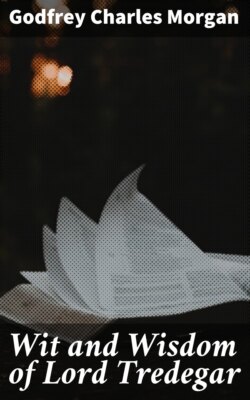Читать книгу Wit and Wisdom of Lord Tredegar - Godfrey Charles Morgan - Страница 3
На сайте Литреса книга снята с продажи.
FOREWORD.
ОглавлениеTable of Contents
There are a few observations which may be deemed appropriate in presenting to the public this collection of extracts from the speeches of Godfrey Charles Morgan, first Viscount Tredegar; but it is inconceivable that any should be necessary by way of apology. During the course of an active and a well-spent life, happily extended beyond the allotted span, Lord Tredegar has made hundreds of public utterances. Innumerable are the functions he has attended during half-a-century and over; and at most of them he has been the central figure. But while his high station would always have secured attention and respect for his words, this volume may serve to prove to future generations what this generation well knows, that Lord Tredegar has held his listeners by his humour or by his earnestness, according to the occasion, and that, in the homely phrase, he has always had "something to say." It is my hope, however, that this little book may have a still worthier mission. For I think it will be found to reveal a noble mind. The simple words of Lord Tredegar have time and again struck deep to the hearts of his audience. Collected here, they reveal the gentleness of his disposition and the purity of his motives. They show the consistency of his life. But they do much more. They appear to constitute a great moral force. Not that his lordship ever posed as preacher, or constituted himself a Court of Judgment on any class of his fellows. There is no trace of a superior tone in his speeches. His words show sympathetic insight into the trials and difficulties that beset the path of every one of us, and his desire was never to censure, but ever to encourage and assist with kindly suggestion and cheering thought.
No aspect of these extracts is so interesting as that which enables us to observe how faithfully and well Lord Tredegar has discharged his promises. Long before he could describe himself as a landowner, he said that if ever he came into that position he would give any assistance he could to his tenants in the way of improving his land. He hoped he would never become "such a ruffian as some people would make landlords out to be." Reading later speeches we find Lord Tredegar undertaking in his turn conscientiously the public duties previously discharged by his father. We find him making the acquaintance of the farmers and studying their difficulties. We find him raising the Tredegar Show to its present pre-eminence in the world of agriculture. It is a noble record of honesty of purpose. And agriculture, as well we know in Wales and Monmouthshire, is but one of Lord Tredegar's many interests. He has spoken wise words on education; he has urged the claims of charity. He has led the way in historical research, and inspired among many whose interest might not otherwise have been aroused a love of our ancient castles and our dear old parish churches. He has spoken eloquently of our Welsh heroes and bards. Upon the value of Eisteddfodau he loves to expound. But it is not these higher interests of his that have made him so beloved. His appeals for the ragged urchin of the streets, his appreciation of the bravery of the worker, his jokes at bazaars, his quips at the cabmen's annual dinners, his love of old customs, his pleasantries at the servants' balls, by these and by his transparent sincerity he has won the affections of all classes of the people, who have found in him a leader who can share sorrows as well as joys. His brave words have been the consolation of the widow of the humble soldier slain in battle, as they have been the encouragement of the boy or girl scholar shyly taking from his hand a prize. He has told the boys they will be all the better for total abstinence, and he has dined and joked with licensed publicans. "Here, at least, is inconsistency," may exclaim the stranger into whose hand this book may fall. But Lord Tredegar justifies himself by the fact that having licensed houses on his estate it is his duty to take an interest in those who conduct them.
Lord Tredegar has never sought to adorn his speeches with rhetoric. He has always spoken so that he who heard could understand. And yet he is reputed justly to be among the best of after-dinner speakers. If it be necessary to delve into the possible secret of his success, one might hazard a guess that it is because in his speeches it is the unexpected that always happens. The transition from grave to gay or from gay to grave is so swift that the mind of the listener is held as it were by a spell, and all is over e'er yet one thought it had begun.
Much of this, however, is in passing. Quite a multitude, at one time or another, has listened to the words of Godfrey Charles Morgan. Quite a multitude has been influenced by them. That multitude, I am sure, will be glad to have those words in permanent form. There may be but a sentence chosen from a speech that has been heard, but that sentence will be remembered or recollected. And to that greater multitude who by the natural force of circumstances cannot have listened to the words of Viscount Tredegar, this little collection may serve to show forth a figure that, though simple, is great in simplicity, and it were strange indeed if some sentences were not found which may help to make a crooked way straight.
The Editor.
